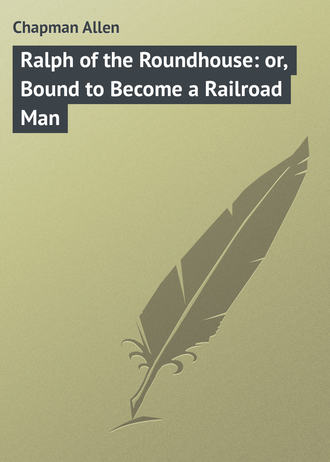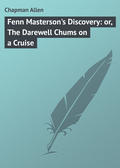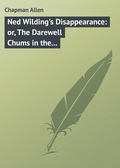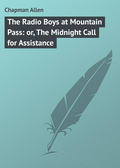
Chapman Allen
Ralph of the Roundhouse: or, Bound to Become a Railroad Man
CHAPTER XXVII-RECALLED TO LIFE
Van landed half-way down the incline. His feet sank deep into the sandy soil, the shock threw him forward with dangerous velocity, and he went head over heels, slid ten feet like a rocket, and reached the bottom of the embankment.
His head landed squarely against the lower board of the fence. Rip! crack! splinter! The contact burst the board into kindling wood. Van drove through and about five feet beyond, and lay still and inert in the bed of the dusty country road.
Ralph believed he was killed. With a groan he leaped to the side of Griscom and grabbed his arm. The engineer's lightning eye followed his speechless indication of Van, and he pulled the machinery to a speedy halt that jarred every bolt and pinion.
Ralph was trembling with dread and emotion. He ran back along the track fifty feet, and breathlessly rushed down the incline at the point where Van had descended.
As he gained the bottom of the embankment his heart gave a great jump of joy. He saw Van move, struggle to a sitting posture, rub his head bewilderedly with one hand, and stare about him as if collecting his scattered senses.
"Are you hurt?" involuntarily exclaimed Ralph.
"Not much- Hello! Who are you?"
Ralph experienced the queerest feeling of his life. He could not analyze it just then. There was an indescribable change in Van that somehow thrilled him. For the first time since Ralph had found him in the old factory he spoke words connectedly and coherently.
A great wave of gladness surged over Ralph's soul. He was a quick thinker. The presentation of the moment was clear. The young doctor at Stanley Junction had said that just as a shock had deprived Van of reason, so a second shock might restore it. Well, the second shock had come, it seemed, and there was Van, a new look in his eyes, a new expression on his face. Ralph remembered to have read of just such extraordinary happenings as the present. He had but one glad, glorious thought-Van had been recalled to life and reason, and that meant everything!
Toot! toot! Ralph glanced at the locomotive where Griscom was impatiently waving his hand. The Great Northern could not check its schedule to suit the convenience of two dead-head passengers.
"Quick, Van," said Ralph, seizing the arm of his companion-"hurry, we shall be left."
"Left-how? where?" inquired Van, resisting, and with a vague stare.
"To the locomotive. We must get back, you know. They won't wait."
"What have I got to do with the locomotive?"
"You just jumped from it."
"Who did?"
"You."
"You're dreaming!" pronounced Van.
"What you giving me-or I've been dreaming," he muttered, passing his hand over his forehead again.
Ralph suddenly realized that Van regarded him as an entire stranger, that time and explanation alone could restore a friendly, comprehensive basis.
He gave Griscom the go ahead signal. The engineer looked puzzled, but there was no time to waste, for the tracks were now signaled clear ahead. He put on steam and the train moved on its way, leaving Ralph and Van behind.
The boy paid no further attention to locomotive or Ralph. He struggled to his feet, and looked up the country road, then down it. The gig had disappeared, but a cloud of dust lingered in the air over where it had just turned a bend.
Van started forward in this direction. There was a pained, confused expression on his face, as if he could not quite get the right of things. Ralph came up to him and detained his steps by placing a hand on his arm.
The way Van shook off his grasp showed that he had lost none of his natural strength.
"What you want?" he asked suspiciously.
"Don't you know me?"
"Me? you? No."
"Hold on," persisted Ralph, "don't go yet. You are Van."
"That's my name, yes."
"And I am Ralph-don't you remember?"
"I don't."
"Ralph Fairbanks."
Van gave a start. He squarely faced his companion now. His blinking eyes told that the machinery of his brain was actively at work.
"Fairbanks-Fairbanks?" he repeated. "Aha! yes-letter!"
His hand shot into an inside coat pocket. He withdrew it disappointedly. Then his glance chancing to observe for the first time, it seemed, the suit he wore, apparel that belonged to Ralph, he stood in a painful maze, unable to figure out how he had come by it and what it meant.
"You are looking for a letter," guessed Ralph.
"Yes, I was-'John Fairbanks, Stanley Junction.' How do you know?" with a stare.
"Because I am Ralph Fairbanks, his son. When you first showed it to me-"
"Showed it to you?"
"Yes."
"Where?
"At Stanley Junction."
"I never was there."
"I think you were."
"When?"
"About three weeks ago. And you just left there this morning. You was with me on that locomotive that just went ahead, jumped off, and-you had better sit down and let me explain things."
Van looked distressed. He was in repossession of all his faculties, there was no doubt of that, but there was a blank in his life he could never fill out of his own volition. He studied Ralph keenly for a minute or two, sighed desperately, sat down on a bowlder by the side of the road, and said:
"Something's wrong, I can guess that. I had a letter to deliver, and it seems as if it was only a minute ago that I had it with me. Now it's gone, I find myself here without knowing how I came here, with you who are a stranger telling me strange things, and-I give it up. It's a riddle. What's the answer?"
Ralph had a task before him. In his judgment it was best not to crowd things too speedily, all of a jumble.
"You came to Stanley Junction with a letter about three weeks ago," he said. "It seemed you had dead-headed it there on the trucks from some point down the line."
Van nodded as if he dimly recalled all this.
"You hid in an old factory, or went there to take a nap. A baseball struck your head accidentally. We took you to our home, you have been there since."
"That's queer, I can't remember. Yes-yes, I do, in a way," Van corrected himself sharply. "Was there a chicken house there-oh, such a fine chicken house!" he exclaimed expansively, "with fancy towers made out of laths, and a dandy wind vane on it?"
"You built that chicken house yourself," explained Ralph.
"Oh, go on!" said Van incredulously.
"Well, you did."
"And there was a lady there, dressed in black," muttered Van, his glance strained dreamily. "She was good to me. She used to sing sweet songs-just like a mother would. I never had a mother, to remember."
Van's eyes began to fill with tears. Ralph was touched at the recognition of his mother's gentleness. Emotion had lightened the shadows in Van's mind more powerfully than suggestion or memory.
Ralph felt that he had better rouse his companion from a retrospective mood.
"You're all right now," he said briskly.
"And I was knocked silly?" observed Van "I see how it was. I've been like a man in a long sleep. How did I come out of it, though?"
"Just as you went into it-with a shock. I took you for a trip on a locomotive. Just as we got near here you made a sudden jump, rolled down the embankment, your head burst through that fence board yonder, and I thought you were killed."
Van felt over his head. He winced at a sensitive touch at one spot, but said, with a light laugh:
"I've got a cast-iron skull, I guess! But what made me jump from the locomotive? Did I have daffy fits?"
"Oh, not at all."
"Well, then?"
"Why," said Ralph, "I think the sight of a man in a long linen duster, driving a one-horse gig down this road startled you or attracted your attention, or something of that sort."
"Ginger!" interrupted Van, jumping to his feet, "I remember now! It was-him! And I've got to see him. He went that way. I'm off."
"Hold on! hold on!" called the dismayed Ralph.
But Van heard not, or heeded not. He sprinted for the bend in the road, Ralph hotly at his heels.
CHAPTER XXVIII-MYSTERY
Ralph outran his competitor, then kept easy pace with him, and did not try to stop him. He recognized a certain obstinacy and impetuousness in Van that he felt he must deal with in a politic manner.
He noticed, too, that Van was not in normal physical trim. The roll down the embankment had wrenched one foot slightly, and when they came to the bend to discover no gig in sight, and a series of other bends ahead, Van halted, breathless and tired.
"Give it up!" he panted, sinking to a dead tree. "Oh, well! I can catch him up later. Twenty-miles tramp, though."
"You seem to know who the man in the linen duster is?" ventured Ralph.
"Oh, yes."
"Is it important that you should see him?"
"Well, I guess so!"
Van was close-mouthed after that. He lay back somewhat wearily on the log and closed his eyes. The reaction from his tumble was succeeding the false energy excitement had briefly given him.
"See here," said Ralph, "I suggest that you take a little snooze. It may do you a heap of good."
"Wish that lady was here to sing one of her sweet songs!" murmured Van. "I just feel collapsed."
"If you will stay here quietly for a few minutes," suggested Ralph, "I will go to that house over yonder and get some water and a bite to eat. That will make you feel better. We had a lunch, but it was left behind on the locomotive."
"All right," said Van sleepily.
He seemed instantly to sink into slumber. Ralph waited a few moments, then he went over to a house on the outskirts of the town, all the time keeping an eye directed towards the spot where he had left his companion.
A woman stood in its open doorway. She had witnessed the jump from the locomotive, and referred to it at once.
"Where's the boy who was with you?" she inquired.
Ralph pointed to the spot where he had left Van.
"Was he hurt much?"
"I think not at all seriously. He's played out, though, and I have advised him to sleep a little."
"That's right," nodded the woman. "Natur's the panoseeds for all sich. That-and hot drops. You just take him a little phial of our vegetable hot drops. They'll fix him up like magic."
"Why, thank you, madam, I will, if you can spare them," said Ralph. "I was also going to ask you to put me up a bite of something to eat and let me have a bottle of water."
"Surely I will," and the good-hearted woman, pleased with Ralph's engaging politeness, bustled off and soon returned with a paper parcel, a two-quart bottle of water and a little phial filled with a dark liquid.
Ralph insisted on leaving her twenty-five cents, and went back to his friend with a parting admonition "to be sure and give him the hot drops soon as he woke up."
Van was sleeping profoundly, and Ralph did not disturb him. He sat watching the slumberer steadily. Van seemed to have placid, pleasant dreams, for he often smiled in his sleep, and once murmured the refrain of one of Mrs. Fairbanks' favorite songs.
An hour later Van turned over and sat up quickly. Ralph had been somewhat anxious, for he did not know what phase his companion's condition might assume at this new stage in the case. Van came upright, however, and dispelled vague fears-clear-eyed, smiling, bright as a dollar.
"Hello!" he hailed-"locomotive, friend, embankment. You're Fairbanks?"
"That's right," said Ralph-"you remember me, do you?"
"Sure, I do. What's in the bundle? Grub? and the bottle? Water? Give me a swig-I'm burned up with thirst."
"This first," said Ralph, producing the phial, and explaining its predicted potency. "Half of it-now some water, if you like."
Van choked and spluttered over the hot decoction. Ralph was immensely gratified as he followed it up by eating a good meal of the home-made pie, biscuits and cheese with which the kindhearted woman at the nearest house had provided them.
Van's affliction had lifted like a cloud blown entirely away by a brisk, invigorating breeze.
"Rested and fed," he declared, with a sigh of luxurious contentment and satisfaction. "So I was crazy, eh?" he bluntly propounded.
"Certainly not."
"Idiotic, then?"
"Hardly," dissented Ralph. "My mother has grown to think almost as much of you as she does of me-"
"Bless her dear heart!"
"You've made our home lot look like the grounds of some summer villa," went on Ralph. "That don't look as though there was much the matter with you, does it?"
"But there was. It's all over now, though. My head is clear as a bell. I remember nearly everything. Now I want you to tell me the rest."
Ralph decided it was the time to do so. They would certainly be at cross-purposes on many perplexing points, until his companion had gained a clear comprehension of the entire situation.
There was never a more attentive listener. Van's eyes fairly devoured the narrator, and when the graphic recital was concluded, his wonderment, suspense, surprise and anxiety all gave way to one great manifestation of gratitude and delight, as he warmly grasped Ralph's hand.
"I never read, heard or dreamed of such treatment!" declared the warm-hearted boy. "You cared for me like a prince!"
"Seeing that I had so effectually put you out of business," suggested Ralph, "I fancy I had some responsibility in the case."
"I want to see your mother again," said Van, in a soft, quivering voice. "I want to tell her that she's woke up something good and happy and holy in me. I was a poor, friendless, homeless waif, and she kept me in a kind of paradise."
"Well, you have woke up to more practical realities of life," suggested Ralph, "and now what are you going to do next?"
But Van could not get away from the theme uppermost in his mind.
"And you are John Fairbanks' son?" he continued musingly. "And I landed against you first crack out of the box! That was queer, wasn't it? Some people would call it fate, wouldn't they? It's luck, anyhow-for you sure, for me maybe. The letter didn't tell you anything, though. Now what should I do? Say, Fairbanks, let me think a little, will you?"
Ralph nodded a ready acquiescence, and Van sat evidently going over the situation in his mind. As he looked up in an undecided way, Ralph said:
"I don't see any great occasion for secrecy or reflection. You were sent to deliver a letter?"
"Yes, that's so."
"To my father. My father is dead. We open the letter, as we have a right to do. It satisfies us that the writer knows considerable that might vitally affect our interests. Very well, it seems to me that your duty is to take me, the representative of John Fairbanks, straight to the person who wrote that letter."
"Yes," said Van, "that looks all clear and nice enough to you, but I don't know how he might take it."
"You mean the writer of the letter?"
"Of course."
"Whose name is Farwell Gibson."
"I didn't say so," declared Van evasively.
"But I know it, don't I? Have you any reason for concealing his identity?"
"Yes, sir, I have," declared Van flatly.
"Why?"
"I can't tell you that. See here, Fairbanks, you guess what you like, but until I have reported the result of my mission to-to him, I have no right to say another word."
"All right," assented Ralph. "It will all come out clear in the end, only before we drop the subject I would like to make another guess."
"What is it?" challenged Van.
"That man in the long linen duster in the one-horse gig was Farwell Gibson."
CHAPTER XXIX-A RIVAL RAILROAD
There was some mystery about Farwell Gibson, Ralph decided, and the more he scanned what he knew of his past, his peculiar method of sending the letter to his father, and Van's guarded manner, the more he was satisfied that there was a puzzle of some kind to solve.
The sun was going down and night was coming on apace. Ralph propounded a pertinent query.
"What is your next move, Van?"
"I don't mind telling you-to get after that one-horse gig."
"It's home by this time, probably."
"I intend to follow it."
"I think I had better go with you, Van," suggested Ralph.
"Why not? You don't think I am anxious to shake the best friend I ever had, do you? There's just this, though: Mr. Gibson is a kind of a hermit."
"And does not like strange society? I see. Well, I shall not intrude upon him until you have paved the way. Let me keep with you. When you get near his home go on ahead and report just how matters stand. If he cares to see me, I shall be glad. If he don't, there's an end to it."
"That's satisfactory," assented Van heartily. "I guess he will be willing to see you."
"I hope so, Van."
"And if he does, I know you will be glad he did," declared Van convincedly.
"Do you intend to start for his place to-night?" inquired Ralph.
"I think we might. I feel fresh as a lark, and it's a beautiful night. If we get tired we can stop for a rest, and cover the journey by daybreak."
"By daybreak?" repeated Ralph. "Why, it's an easy four hours' jaunt."
"Is it?" smiled Van. "I guess not."
"Only twenty miles?"
"Yes, but such twenty miles! Why, it's a jungle half the distance."
"Isn't there a road?"
"Not a sign of one. The gig will make it on the cut-around, and that means a good forty miles."
"I see. Very well, Van, I am at your orders," announced Ralph.
He thought it best to secure some more provisions. They went into the village this time, and at a little store secured what eatables they fancied they might need.
The first mile or two of their journey was very fine traveling, for they kept for that distance to the regularly-traversed road the gig had taken.
Then Van, who seemed to know his bearings, directed a course directly into the timber.
"I don't see any particular fault to be found with this," remarked Ralph, after they had gone a couple of miles.
"Oh, this is easy," rejoined Van. "You see, the Great Northern started in right here to make a survey years ago. That's why there's quite a road for a bit. Wait till you come to where they threw up the job. I say, Fairbanks, that's where they missed it."
"Who? what? where?"
"The Great Northern. If they had surveyed right through and made Dover the terminal, they could have still put through what is now the main line, and this route would have kept the Midland Central out of the field."
"You seem pretty well-posted on railroad tactics," said Ralph.
"I am-around these diggings. I've been in the railroad line for two years."
"You a railroader!"
"I call myself one."
"You have worked on a railroad?"
"Sure-for two years."
"What railroad?"
Van regarded Ralph quizzically.
"Tell you, Fairbanks," he said, "that's straight, although the railroad hasn't a name yet, hasn't turned a wheel, is so far only two miles long, and that's all grading and no rails."
"Well, you present a truly remarkable proposition," observed Ralph.
"Isn't it? It's a reality, all the same. And it's the key to a situation worth hundreds of thousands."
"You mystify me," acknowledged Ralph, – "allowing you are in earnest."
"Absolutely in earnest. No joshing. I'm quite interested, too, for I'm one of the two men who have built the railroad so far."
"Who is the other?"
Van shook his head.
"That's a secret, for the present. I think you'll know soon, though-soon as you see Mr. Gibson."
Ralph had to be content with this. He comprehended that there was some basis to Van's railroad pretensions, and felt very curious concerning the same.
At about eleven o'clock that night Van's predictions as to the difficulties in the way of progress were fully verified.
They were apparently in the midst of an untrodden forest. The brush was jungle-like, the ground one continuous sweep of hill and dale.
It took one breathless, arduous hour to cover a mile, and their clothes and hands were scratched and torn with thorns and brambles.
"It's a little better beyond the creek," said Van. "A man could hide in a wilderness like this a good many years in a safe way, eh, Fairbanks?"
"Yes, indeed," answered Ralph, and mentally wondered if his companion was alluding to the mysterious Farwell Gibson.
They were a wearied and travel-worn pair as they lay down to rest at the first token of daybreak. It was at the edge of a level expansive sweep surmounted by a dense growth of trees.
"We're nearly there," proclaimed Van.
"How near?" interrogated Ralph.
"You see that hill?"
"Yes."
"That's our last climb."
"I'm thankful," said Ralph.
They tramped up the slope after a bit. Once over its edge Ralph, looking ahead, made out a low rambling log house. It was about half a mile away, and smoke was coming out of its chimney.
"Now then," said Van with a smile, "I reckon this is about as close as you need come, for the present-it's a great deal closer than many others have come."
"This is a very isolated spot," said Ralph.
"That's Mr. Gibson's house yonder," continued Van. "I'll go on alone, see him, report, and come back and advise you."
"That's business," said Ralph.
"Just wander around and amuse yourself," recommended Van. "You may find something to interest you."
Ralph grew tired of sitting alone and waiting for Van. As his recent companion had advised, he took a stroll. There seemed a break in the timber about one hundred feet to the left. Ralph proceeded in that direction. He paused at a ten foot avenue cut neat and clean through the woods, and stood lost in contemplation.
Far as he could see across the hill this break in the timber continued. The brush had been cleared away, the ground leveled here and there, some rudely cut ties were set in place, and the layout showed a presentable and scientifically laid put and graded roadbed.
"I wonder," said Ralph thoughtfully, "if this is a part of Van's boasted railroad? It looks all right as far as it's gone."
What Ralph scanned represented a great deal of labor, that could be discerned at a glance. He knew enough about survey work to judge that a master mind had directed this embryo railroad project.
Ralph was still inspecting the work when a shrill whistle signaled the return of Van.
"It's all right," he announced as he came up to Ralph. "I've told Mr. Gibson everything. He will see you."
"That's good," said Ralph.
He followed Van to the house in the distance. As he neared it he observed that a man stood in the doorway.
This individual was powerfully built, wore a full bushy beard, and had a keen, piercing eye.
He scanned Ralph closely as he approached, and then, standing partly aside, with a not ungraceful wave of his hand welcomed Ralph to the hospitality of his house.
"You are Mr. Gibson?" said Ralph, feeling impelled to say something.
"Yes, young man, I am that person, and this is the office of the Dover and Springfield Short Line. Come in."







